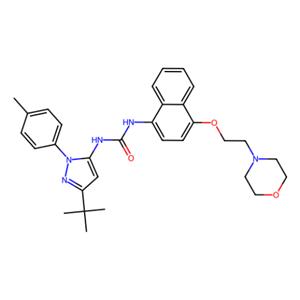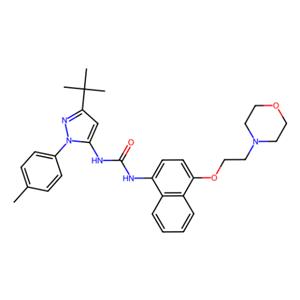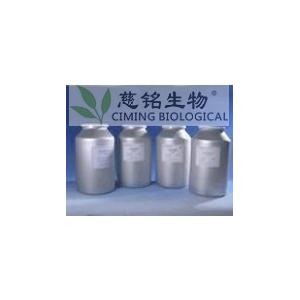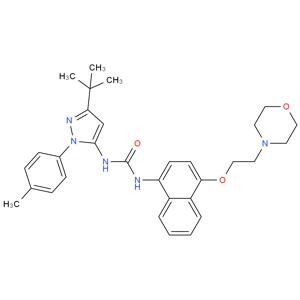网站主页
化工产品目录
生物化工
抑制剂
丝裂原活化蛋白激酶(MAPK)
p38 MAPK 抑制剂
1-[2-(4-甲基苯基)-5-叔丁基吡唑-3-基]-3-[4-(2-吗啉-4-基乙氧基)萘-1-基]脲
达马莫德
达马莫德|T6277
Doramapimod
285983-48-4
285983-48-4
¥229
1mg
起订
¥319
2mg
起订
¥496
5mg
起订
上海 更新日期:2026-02-25
产品详情:
- 中文名称:
- 达马莫德
- 英文名称:
- Doramapimod
- CAS号:
- 285983-48-4
- 品牌:
- TargetMol
- 产地:
- 美国
- 保存条件:
- In solvent: -80°C for 1 year | Shipping with blue ice/Shipping at ambient temperature.
- 纯度规格:
- 97.73%
- 产品类别:
- 抑制剂
- 货号:
- T6277
公司简介
上海陶术生物科技有限公司为美国Target Molecule Corp. ( Target Mol ) 在上海建立的全资子公司。我们与美国波士顿、德国慕尼黑的同事一起,为北美、欧洲和亚洲从事药物研发和生物学研究的科学家提供优质的产品和专业的服务。公司下设筛选事业部,化学事业部,生物事业部和新材料部。
从虚拟筛选到实体化合物分子供应;从商业化产品销售到个性化定制合成;从对明确靶点的分子筛选到对明确分子的多靶点筛选,从高通量筛选到化学结构优化,我们都可以满足您的科研用品及技术服务的需求。
经过在中国市场五年的精心耕耘,我们已成为筛选化合物领域优秀的供应商,为超过五百家学校和各类企业提供了品质卓越的小分子化合物和药物筛
| 成立日期 | (13年) |
| 注册资本 | 566.2651万人民币 |
| 员工人数 | 100-500人 |
| 年营业额 | ¥ 1亿以上 |
| 经营模式 | 贸易,试剂,定制,服务 |
| 主营行业 | 化学试剂,生物活性小分子 |
达马莫德相关厂家报价 更多
-
![1-[2-(4-甲基苯基)-5-叔丁基吡唑-3-基]-3-[4-(2-吗啉-4-基乙氧基)萘-1-基]脲 | 285983-48-4 含量99% 高纯试剂 陈明 13339985473同微](https://img.chemicalbook.com/SupplyImg2/2025-12-24/Large/202512242025054665089.jpg)
- 1-[2-(4-甲基苯基)-5-叔丁基吡唑-3-基]-3-[4-(2-吗啉-4-基乙氧基)萘-1-基]脲 | 285983-48-4 含量99% 高纯试剂 陈明 13339985473同微
- 湖北威德利化学试剂有限公司 VIP
- 2026-02-28
- 询价
-

- aladdin 阿拉丁 D125100 达马莫德 285983-48-4 ≥99%
- 上海阿拉丁生化科技股份有限公司 VIP
- 2025-11-14
- ¥308.90
-

- aladdin 阿拉丁 D408878 Doramapimod (BIRB 796) 285983-48-4 10mM in DMSO
- 上海阿拉丁生化科技股份有限公司 VIP
- 2025-05-16
- ¥308.90
-

- Doramapimod (BIRB-796)
- 南京百鑫德诺生物科技有限公司
- 2024-09-26
- 询价
-

- 达马莫德
- 深圳市恒丰万达医药科技有限公司
- 2023-06-05
- ¥991.24
-

- 多马莫德,达马莫德
- 广州市亿邦医药科技有限公司
- 2023-06-05
- 询价
-

- 多马莫德、达马莫德Doramapimod 肿瘤坏死因子-α(TNF-α)抑制剂
- 广州市慈铭生物科技有限公司
- 2023-06-05
- ¥4000000
-

- Birb-796,doramapimod
- 天津盈润医药科技有限公司
- 2023-06-05
- 询价
-

- Birb-796,doramapimod 285983-48-4
- 天津新创药物化学研究所
- 2023-06-05
- 询价


